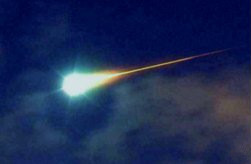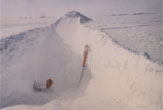




Looking After Your Finds - Reference

Powered By Sispro1

Introduction to Meteors
[2-3]
News
Meteorites
Two tiny meteorites discovered in a 55-year-old snowpack in Antarctica could reveal secrets about the formation of the solar system, scientists say.
Researchers unearthed these fragments by melting and filtering snow that fell in the mid-20th century near the French-Italian CONCORDIA station in the central part of Antarctica . They found a surprisingly un-contaminated sample of objects, many of which have been roaming the solar system for millions of years before ending up on Earth. Their discovery is detailed in the May 7 issue of the journal Science.
"When we melted this snow and we looked at the particles within this very pure snow, we realized that more than one out of two were extraterrestrial," said study leader Jean Duprat of the Universite Paris-Sud in Orsay, France, who was working with the French Polar Institute Paul mile Victor in Antarctica. "It was the first time we had such an intrinsically clean collection."
Weird little rocks from space
The find turned out to be special in other ways, too. For one thing, two of the meteorite fragments were packed with carbon, which is unusual in rocks like this.
"More than half of their volume is made of a carbon-rich material," Duprat told SPACE.com. "This is exceptional because normally if you take a primitive meteorite, the carbon accounts for about a few percent in mass of the whole rock."
Another strange aspect of the meteorite fragments was their large amount of a particle called deuterium, which is a rare form of hydrogen (while the normal nucleus of hydrogen is made of one lone proton, deuterium contains one proton and one neutron).
Both these clues the abundance of carbon and deuterium tell the researchers that the tiny meteorites probably came from comets . Comets are known to deposit material on Earth when they swing in close to the sun and release material that can be captured by Earth's gravity.
"What we know is that these particles are most probably from a parent body that did not evolve since very early in the solar system's history, because the composition of these particles is very primitive," Duprat said.
Older than the planets
The researchers think the fragments they found likely first originated in the solar system before the planets were even formed, when the sun had only a "protoplanetary disk" of material that would later clump into planets.
As such, they offer great clues to how our solar system was built, and could even point toward how life got started on Earth , scientists say. Some experts think that comets and meteorites deposited the organic compounds that would form the seeds of life on our planet.
"The very high carbon contents of [the fragments] may well have profound implications for the original delivery of organic molecules to the early Earth, with possible consequences for the earliest prebiotic chemistry," Carnegie Institution of Washington researcher Larry R. Nittler, who was not involved in the new study, wrote in an accompanying essay in the same issue of Science.
Ancient Meteorites Found to Pack Secrets of the Solar System
By Clara Moskowitz
SPACE.com Senior Writer
posted: 06 May 2010 02:07 pm ET
Meteorites
Two tiny meteorites discovered in a 55-year-old snowpack in Antarctica could reveal secrets about the formation of the solar system, scientists say.
Researchers unearthed these fragments by melting and filtering snow that fell in the mid-20th century near the French-Italian CONCORDIA station in the central part of Antarctica . They found a surprisingly un-contaminated sample of objects, many of which have been roaming the solar system for millions of years before ending up on Earth. Their discovery is detailed in the May 7 issue of the journal Science.
"When we melted this snow and we looked at the particles within this very pure snow, we realized that more than one out of two were extraterrestrial," said study leader Jean Duprat of the Universite Paris-Sud in Orsay, France, who was working with the French Polar Institute Paul mile Victor in Antarctica. "It was the first time we had such an intrinsically clean collection."
Weird little rocks from space
The find turned out to be special in other ways, too. For one thing, two of the meteorite fragments were packed with carbon, which is unusual in rocks like this.
"More than half of their volume is made of a carbon-rich material," Duprat told SPACE.com. "This is exceptional because normally if you take a primitive meteorite, the carbon accounts for about a few percent in mass of the whole rock."
Another strange aspect of the meteorite fragments was their large amount of a particle called deuterium, which is a rare form of hydrogen (while the normal nucleus of hydrogen is made of one lone proton, deuterium contains one proton and one neutron).
Both these clues the abundance of carbon and deuterium tell the researchers that the tiny meteorites probably came from comets . Comets are known to deposit material on Earth when they swing in close to the sun and release material that can be captured by Earth's gravity.
"What we know is that these particles are most probably from a parent body that did not evolve since very early in the solar system's history, because the composition of these particles is very primitive," Duprat said.
Older than the planets
The researchers think the fragments they found likely first originated in the solar system before the planets were even formed, when the sun had only a "protoplanetary disk" of material that would later clump into planets.
As such, they offer great clues to how our solar system was built, and could even point toward how life got started on Earth , scientists say. Some experts think that comets and meteorites deposited the organic compounds that would form the seeds of life on our planet.
"The very high carbon contents of [the fragments] may well have profound implications for the original delivery of organic molecules to the early Earth, with possible consequences for the earliest prebiotic chemistry," Carnegie Institution of Washington researcher Larry R. Nittler, who was not involved in the new study, wrote in an accompanying essay in the same issue of Science.
Ancient Meteorites Found to Pack Secrets of the Solar System
By Clara Moskowitz
SPACE.com Senior Writer
posted: 06 May 2010 02:07 pm ET

For more on Meteor-ites see: Paragon of Space Publication - Meteorites
Copyright All Rights Reserved by Nigel G Wilcox E-Mail: ngwilcox100@gmail.com
Group Pages
Meteorites
Complimentary Topics
Designed by Nigel G Wilcox
The Paragon Of Metal Detecting
& Archaeology
& Archaeology
Pages
Member NCMD
Reference Menu
Reference Menu




















